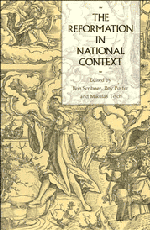1 - Germany
Published online by Cambridge University Press: 04 December 2009
Summary
The German Reformation began in 1520, when the ‘Luther affair’, the debate among churchmen, scholars and theologians provoked by Luther's 1517 attack on indulgences, became a significant issue in the political agenda of the German-speaking territories of the Holy Roman Empire. The development of ‘Luther's cause’ from an academic dispute into a major public confrontation was a gradual process, in which many elements were added consecutively to the initial conflict until they produced a chain reaction involving theological ideas, religious conviction, political interests, social grievance, economic repercussions and the tortuous manoeuvring of international diplomacy. From the very beginning, the German Reformation was not, as its propagandists (and subsequent confessional historians) were to claim, a clear, pure, invigorating stream from which one had only to drink to take refreshment, but a heady brew containing many compounds whose effects on those who imbibed it were not always calculable. Thus, the four or five years after 1520 were years of rapid change, confusing upheaval and dizzying leaps into the unknown, often described as the ‘wild growth’ of the Reformation, in analogy with the exuberance of a garden which has received too much heat and water all at once. It was driven forward not by coolheaded discussion and debate, but by passionate polemic and fevered propaganda, rather like a too enthusiastic application of growth hormones to already overlush vegetation.
In the years 1520–3 the growing demands for religious change developed into forms of direct action, challenging and then dismantling the old apparatus of religious worship and institutionalised forms of church life.
- Type
- Chapter
- Information
- The Reformation in National Context , pp. 4 - 29Publisher: Cambridge University PressPrint publication year: 1994
- 3
- Cited by



